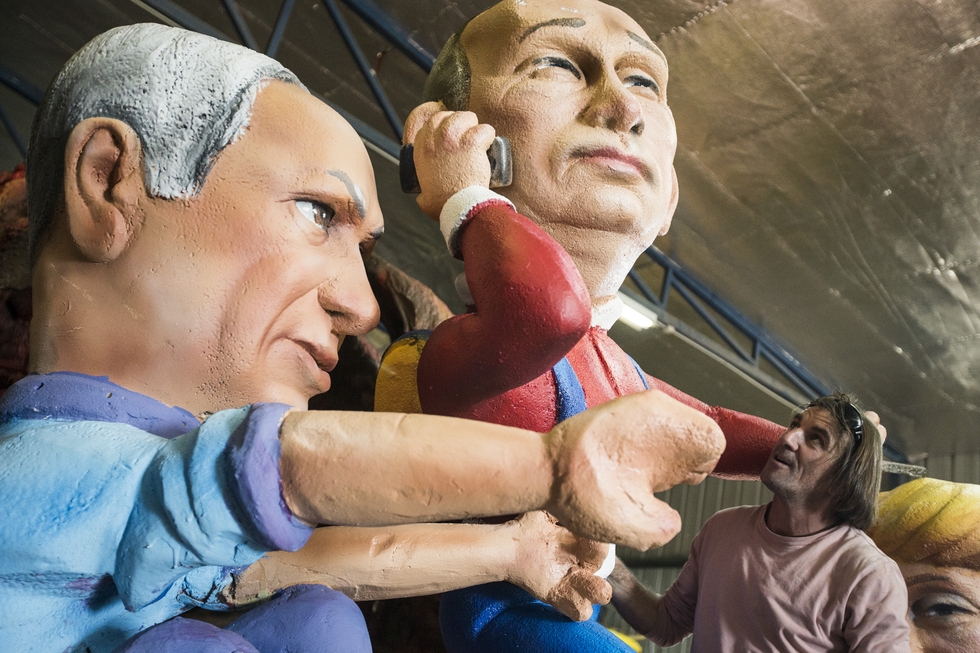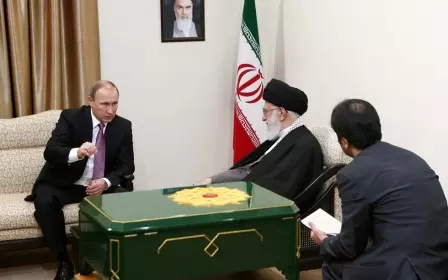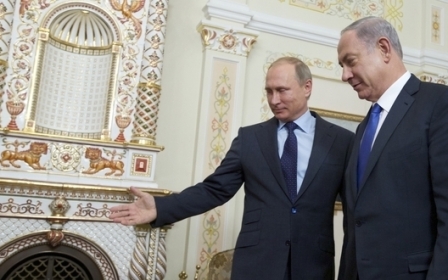Russia, Israel and Syria: An inconvenient truth

Throughout the Syrian conflict, the regime and its supporters have tried to portray opposition to the revolution as synonymous with opposition to Israel. The aims of this propaganda campaign are to attract support, undermine the uprising, and stymie widespread revulsion in the region at the Syrian regime's brutality and the direct military support it is receiving from its foreign allies (primarily Iran, Russia, and Lebanon's Hezbollah).
Such efforts suffered a blow when Hamas - the Palestinian component of the so-called "axis of resistance," comprising Hezbollah, Damascus and Tehran - publicly endorsed the revolution, saluting "the heroic people of Syria who are striving for freedom, democracy and reform".
Russia's support for Syrian President Bashar al-Assad has further undermined his camp's anti-Israel credentials. Moscow's direct military involvement in Syria - setting up bases, sending troops and carrying out air strikes - is credited with saving a regime that by this summer seemed near collapse. It was initially portrayed by Assad supporters and Israelis alike as a potential threat to Israel's ambitions and room for manoeuvre in Syria.
However, Russia's direct involvement has actually served to highlight its increasingly close ties with Israel. This robust relationship is downplayed by Israel so as not to antagonise the US, by Russia so as not to alienate Damascus and Tehran, and completely ignored by the "axis of resistance" - now minus Hamas - so as to avoid embarrassment.
The alliance claims to be the champion of the Palestinian cause (while the Assad regime starves and bombs Palestinian refugees in Yarmouk). However, the alliance's key ally Moscow is also a key ally of the very country that the axis is supposed to be resisting (although this role of resistance has long been reduced to mere lip service as the alliance busily kills Syrians instead).
While Israel was slaughtering Palestinian civilians in Gaza last year, Russian President Vladimir Putin said: "I support the struggle of Israel as it attempts to protect its citizens." Months earlier, Israel - like Iran, Lebanon and Syria - refused to condemn Russia's annexation of Crimea.
At a time of regional and international expressions of solidarity with Gaza against Israel's onslaught, Assad took a swipe at Hamas - which governs the territory - speaking of "amateurs who wear the mask of resistance according to their interests in order to improve their image or to consecrate their authority".
This from someone who - like Iran - has never directly resisted Israel, even against the occupation of Syrian territory and repeated violations of Syrian sovereignty (it seems Palestinian and Lebanese lives are more expendable in the service of resistance).
Saving Assad 'not necessarily' bad for Israel
Moscow notified Israel prior to the launch of its air campaign in Syria on 30 September. Days before, Israeli Prime Minister Benjamin Netanyahu met with Putin in Russia. Netanyahu was not accompanied by the press, but did bring along top generals who, as Israel's Jerusalem Post newspaper pointed out, "very rarely accompany the prime minister on his trips abroad".
This led to speculation about the extent of bilateral collusion regarding the air campaign, which Netanyahu has not criticised (in October, a confidant of his told Reuters that "a Russian partnership with Iran and Hezbollah to save Assad is not necessarily bad for us").
Immediately after his meeting with Putin, Netanyahu said Moscow had given him assurances that it would not stand in the way of Israeli strikes on Syrian arms transfers to Hezbollah - something Putin did not deny.
Indeed, despite Russia deploying its most advanced air-defence systems to the Syrian conflict, Israel last week carried out several raids north of Damascus unhindered, reportedly targeting a four-truck regime convoy loaded with ballistic missiles. So much for Assad supporters' hope that Moscow would clip Israeli wings in Syria.
Israeli Defence Minister Moshe Yaalon summed up the situation between his country and Russia vis-a-vis Syria as: "We don't interfere with them, and they don't interfere with us." However, it goes much further than simply staying out of each other's way.
Amos Gilad, director of the political-security division in Israel's Defence Ministry, last month highlighted the "excellent security coordination" that "started right after the meeting between Netanyahu and Putin," which took place days before the launch of the Russian air campaign.
A hotline was set up, and joint air exercises have been carried out. After further talks with Putin at the end of November, Netanyahu announced increased military coordination regarding air strikes in Syria.
Turkey in the triangle
Both Moscow and Israel have sought to make the latter a beneficiary of the spat over Turkey's downing of a Russian warplane. Putin has cited Israel as an alternative to Turkish imports, and Israel has expressed its willingness to fill the gap. It is also investing an extra $2.6 million in a campaign to attract Russian tourists following restrictions on their travel to Turkey and Egypt, which together accounted for a third of all Russian tourists last year.
In a clear and public display of political point-scoring following Turkey's downing of the warplane, Israeli officials said Russian fighter jets at times enter Israeli air space, but such incidents are resolved via communication.
Israel has enjoyed close relations with Russia under Putin. It was the first country he visited after his re-election in 2012, and as Haaretz correspondent Anshel Pfeffer points out: "Throughout his rule, he has made sure each year to meet with Israeli leaders." As of 2014, Russia is Israel's largest supplier of crude oil.
However, the seeds of those close ties were sown with the collapse of the Soviet Union in 1991, which led to an influx of Jews from former Soviet states to Israel. They now comprise more than a million of Israel's 8.2 million citizens - the third-largest number of Russian speakers outside the former Soviet states, and the highest as a proportion of the total population.
Moscow has the largest Israeli expatriate community in the world, almost all of them native Russian speakers. The language is now the third most widely spoken in Israel after Hebrew and Arabic.
As such, close bilateral ties should come as little surprise. However, it is at best ignorant, and at worst deceitful, for the pro-Assad camp to portray Russia's deeper involvement in Syria as an obstacle to Israel's power and ambitions.
The "axis of resistance" is becoming ever-more reliant on a country whose relations with Israel are going from strength to strength - an inconvenient truth to which the alliance and its supporters continue to turn a blind eye.
- Sharif Nashashibi is an award-winning journalist and analyst on Arab affairs. He is a regular contributor to Al Arabiya News, Al Jazeera English, The National, and The Middle East magazine. In 2008, he received an award from the International Media Council "for both facilitating and producing consistently balanced reporting" on the Middle East.
The views expressed in this article belong to the author and do not necessarily reflect the editorial policy of Middle East Eye.
Photo: An artist stands next to effigies of Israeli Prime Minister Benjamin Netanyahu (L) and Russian President Vladimir Putin, during preparations for the Jewish festivities of Purim, on 10 February, 2014 in the Israeli central town of Jaljulia (AFP).
Stay informed with MEE's newsletters
Sign up to get the latest alerts, insights and analysis, starting with Turkey Unpacked
Middle East Eye delivers independent and unrivalled coverage and analysis of the Middle East, North Africa and beyond. To learn more about republishing this content and the associated fees, please fill out this form. More about MEE can be found here.





